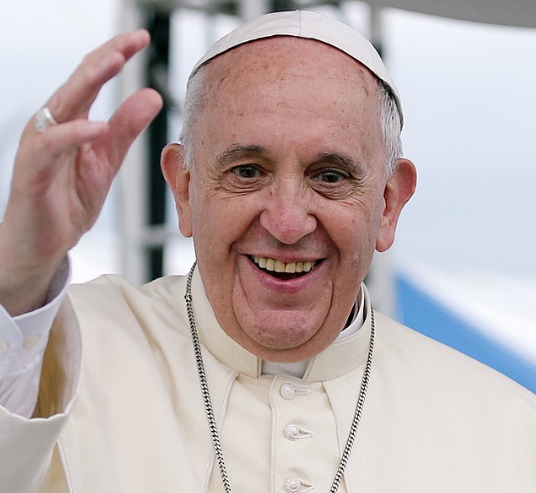Why the World Should Listen to Pope Francis

Sometimes, amid the heated political debate about what should done by the U.S. government in world affairs, a proposal cuts through the TV babble of the supposed experts with a clear, useful suggestion.
That proposal came on August 17, when Pope Francis told journalists how he thought the world should cope with the challenge posed by ISIS, the Islamic militant group engaged in murderous behavior in Syria and Iraq. “One nation alone cannot judge how you stop this,” he said, in an apparent reference to U.S. action against ISIS crimes. Instead, the United Nations is the proper forum to “discuss 'Is there an unjust aggression' ” and “ 'How should we stop it?' Just this. Nothing more.”
The idea that the responsibility for dealing with global problems lies with the world community rather than with individual nations is not a popular one among the governments of the major military powers. Indeed, they seem to believe that they are justified in doing whatever they want in the world if it serves what they consider their “national interest.” The Russian government, angered at NATO’s eastward expansion and at political developments in Ukraine, annexed Crimea and armed pro-Russian separatists. The Israeli government, attempting to incorporate Palestinian territory it conquered 47 years ago into greater Israel, has moved 500,000 settlers onto the land and staged bloody military invasions of Gaza to crush resistance. Anxious to control the oil-rich Middle East, the U.S. government launched a military invasion and occupation of Iraq that led to enormous bloodshed in that country and the destabilization of the entire region. And numerous other governments with powerful military forces have behaved in much the same manner, thereby helping to foster a chaotic and violent world.
This aggressive use of military force is not a new phenomenon. Indeed, it’s been par for the course throughout the history of nations and, before that, the history of competing territories. It’s what brought the world to the brink of total disaster during World Wars I and II.
What is new is the dawning recognition that the world can no longer continue down this destructive path―that the competition among nations must be handled within the framework of an international security system. After all, there is no reason to assume that any individual nation can divorce itself from its own special “interests” and adopt an impartial stance when it comes to world affairs. Despite the claims of rabid nationalists and theocrats, God has not decreed that their nation should rule the world. Instead, an institution representing all nations should speak for the international community.
Based on this recognition―one helped along by two world wars―numerous governments reluctantly agreed in the twentieth century to develop the League of Nations and, when this new institution proved too weak to be effective, the United Nations. In the words of the UN charter, the United Nations was founded “to save succeeding generations from the scourge of war,” as well as to “to reaffirm faith in fundamental human rights,” “to establish conditions under which justice and respect for the obligations arising from treaties and other sources of international law can be maintained,” and “to promote social progress and better standards of life in larger freedom.”
In the immediate aftermath of World War II―which left 60 million dead and a world in ruins―the governments of powerful nations paid lip service to the United Nations and to the international security system it represented. Sometimes, they even fell into line with its decisions.
But, unfortunately, they were soon back at their old game. The United States and the Soviet Union occupied other nations, launched military invasions, and staged covert operations around the world in their bitter Cold War conflict with one another. France fought vicious colonial wars to subdue independence struggles in Indochina and Algeria. Britain, France, and Israel invaded Egypt. China annexed Tibet and invaded India and Vietnam. India and Pakistan squared off to fight numerous border wars. In the context of this persistent flouting of international law by the great powers and some others, the United Nations managed to remain the conscience of the world and to engage in humanitarian projects, but was gradually drained of its power to enforce world security.
Clearly, this is a profoundly dangerous situation, especially when the nations of the world spend $1.75 trillion a year on war and preparations for war. An array of global problems―including not only national insecurity, but climate change, disease, and poverty―cry out for global solutions. But we are not likely to see these solutions in a world of international anarchy, one in which the “national interest” continues to trump the human interest.
It’s time―indeed, long past time―for governments to strengthen the United Nations and, as Pope Francis has reminded us, to respect its authority as the voice of the world community.